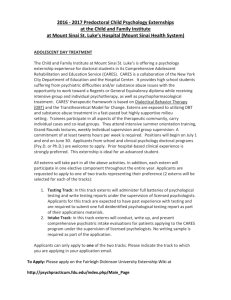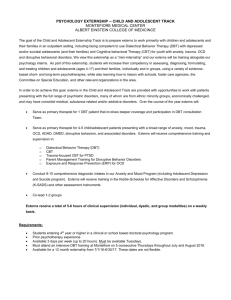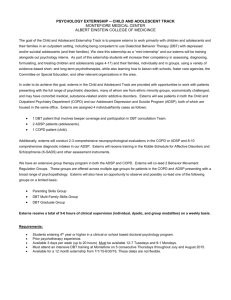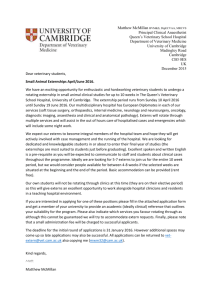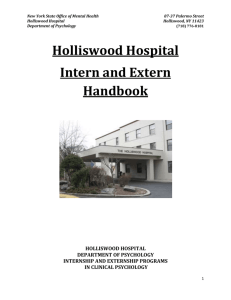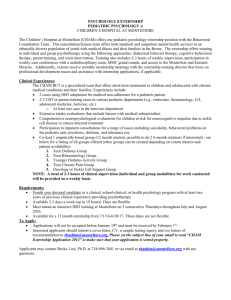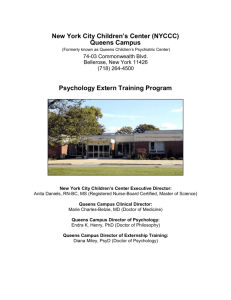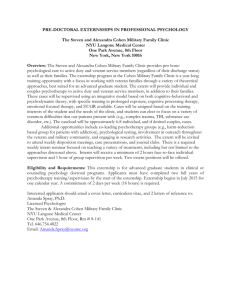psychology service staff
advertisement
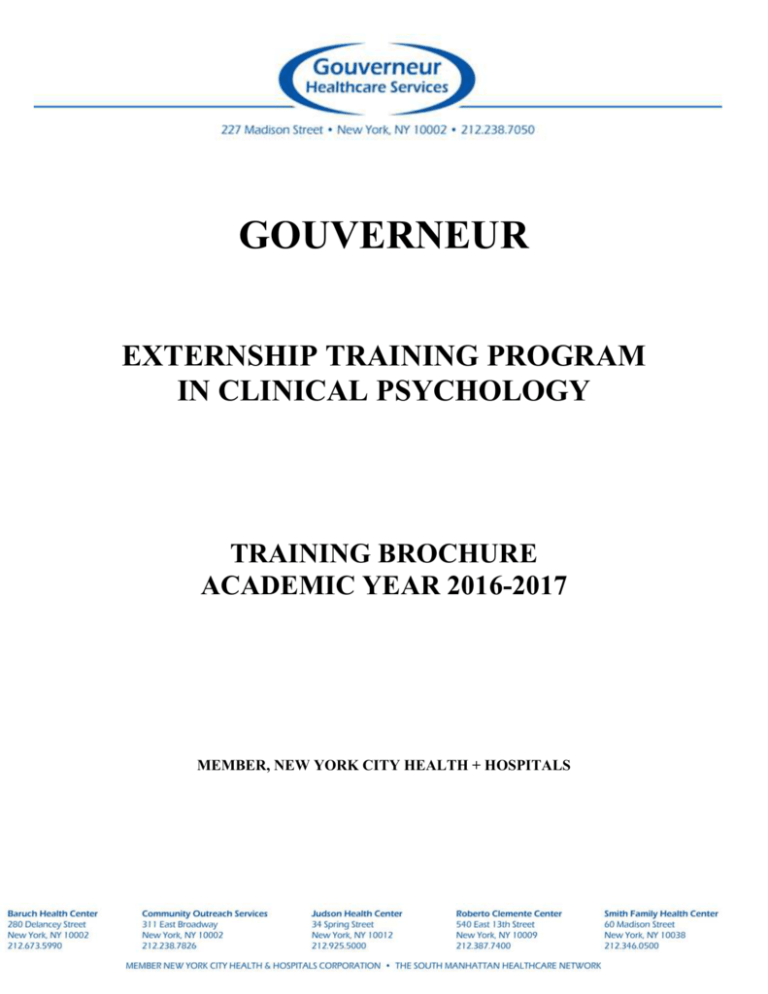
GOUVERNEUR EXTERNSHIP TRAINING PROGRAM IN CLINICAL PSYCHOLOGY TRAINING BROCHURE ACADEMIC YEAR 2016-2017 MEMBER, NEW YORK CITY HEALTH + HOSPITALS GOVERNEUR EXTERNSHIP TRAINING PROGRAM IN CLINICAL PSYCHOLOGY Gouverneur’s Diagnostic and Treatment Center, in professional affiliation with the New York University School of Medicine (NYUSOM) and Bellevue Hospital Center (BHC), provides a major portion of the outpatient mental health services for the lower Manhattan area of New York City. The lower Manhattan area is characterized by a broad diversity of ethnic, linguistic and racial groups. It includes large numbers of non-English speaking immigrants of Hispanic, Chinese, Italian, and Jewish backgrounds. The broad diversity of our patient population challenges our Department of Behavioral Health to provide much needed mental health services in a culturally relevant and sensitive fashion. The stresses of acculturation, poverty, and discrimination place our patient population at high risk for physical illness and psychological disturbance. Further, the lower Manhattan area has been officially designated as a poverty area by the Office of Economic Opportunity and has the second highest incidence of state hospitalizations in New York City. Despite the influx of new immigrant groups and a trend toward gentrification, there is a sense of stability to the area, which attracts a family-oriented population that uses the services at Gouverneur for many healthcare needs. The Department of Behavioral Health significantly expanded its clinical programs beginning in the early 1980’s to meet the needs of specific patient populations, such as young adults with chronic mental illnesses, psychologically impaired homeless individuals, and the isolated impaired elderly. Additionally, the Department of Behavioral Health has implemented a unique program geared to meeting the mental health needs of the Chinese immigrant community. This program, the Asian Bicultural Clinic (ABC), brings together several clinical components to provide culturally sensitive and competent care through multidisciplinary bilingual and bicultural staff. In addition to implementing innovative clinical services, the psychology staff is encouraged to pursue their own training as mental health professionals and to participate actively in the clinical training of all disciplines. Ongoing training is offered to psychology externs and social work interns both through didactic seminars on a range of clinical topics and monthly grand rounds, during which both in-house staff and experts in clinical areas from the general professional community are invited to present on various relevant clinical topics. The psychology service functions within the Department of Behavioral Health at Gouverneur. The staff, at present, is comprised of 5 full-time and 2 part-time psychologists. Specialties of the staff include psychodynamic psychotherapy, Dialectical Behavioral therapy, stress and pain management, hypnosis, cognitive-behavioral therapy, child and adolescent psychotherapy, family therapy, group therapy, integrative psychotherapy, crisis intervention, treatment of trauma, psychological, psychoeducational, and neuropsychological testing and assessment, and dementia screenings. Psychologists are assigned to many of the units within the department, including the Adult Service, Walk-In Clinic, Child and Adolescent Service (C&A), Women’s Comprehensive Health Program (WP), Center for Older Adults and their Families (CFOA), Asian Bicultural Clinic (ABC), and World Trade Center Mental Health Clinic (WTC). Staff members perform a variety 2 of functions, including intake assessment of new patients, crisis intervention, individual and group psychotherapy, psychological testing, neuropsychological assessment, teaching seminars, and providing supervision and consultation. A primary component of the psychology service is the externship training program in clinical psychology for doctoral level candidates. EXTERNSHIP MISSION STATEMENT The Gouverneur externship training program in clinical psychology offers psychology externs an intensive and wide-ranging clinical and educational experience firmly rooted in multicultural values and community service. The primary emphasis of the academic yearlong externship program is the continued professional development of the psychology extern and solid preparation for future intensive training, i.e. pre-doctoral internship, and eventual transition from advanced-level student to beginning professional. TRAINING PROGRAM AND TRAINING GOALS Under close supervision and support, psychology externs gain clinical experience with a variety of psychotherapy modalities (individual, group, family, and couples) as well as psychological and neuropsychological assessments, while serving a population that encompasses a broad variety of ages, cultures, illnesses, and levels of functioning. It is important to note that the externship training staff encourages externs to communicate and pursue their clinical interests as available in the department. Further, a key educational component of the training program is working as part of a multidisciplinary team. This approach is vital not only to the comprehensive care of patients, but also to the education of the trainee. By the end of the training year, externs may expect to have developed skills, knowledge and flexibility to confront – proficiently, ethically, and creatively – the challenges of working in an urban outpatient community mental health clinic and treating patients who present with emotional concerns that are multi-determined and compounded by various medical, cognitive, socioeconomic, and familial struggles. TRAINING OPPORTUNITIES The externship program comprises of seven positions in 6 tracks: Asian Bicultural Clinic (ABC) Trauma Track, Dialectical Behavioral Therapy Track, Health Psychology Track (2 positions), Family/Couples Therapy Track, Severe Mental Illness Track, and Trauma Track. The tracks reflect specific treatment modalities and/or the population the extern will be working with. The tracks do not exclude opportunities to work with patients with other psychopathology, age groups, and other diversities. For instance, externs in the DBT track will co-lead a weekly DBT skills-training group with a psychologist and participate in a weekly DBT consultation team meeting but will also be assigned patients from a wide array of backgrounds and psychopathology from the general clinic. Detailed description of the tracks follows: Asian Bicultural Clinic trauma track: The extern in this track will be assigned monolingual Chinese-speaking patients whose diagnoses range from mood disorders to schizophrenia and other psychotic spectrum 3 diagnoses. Working with Dr. Chen, the extern can expect to learn about immigration trauma experienced by many undocumented Chinese patients, the impact of such trauma on the development of psychiatric illnesses, the influence of attitudes about mental health treatment in the Chinese community, strategies to overcome treatment obstacles in the cultural context, strategies to build insight and increase treatment adherence, and rehabilitation of patients into the community. In addition, the extern will be assigned individual patients from the general adult clinic with histories of trauma and will have an opportunity to co-lead a trauma recovery group using modalities of mindfulness and chair yoga. Externs with Chinese language proficiency will be given priority. Dialectical Behavioral Therapy track: Externs in the DBT track will co-lead a DBT skills group and attend a consultation team meeting on a weekly basis. Externs participate in this meeting by taking a turn along with other members in leading mindfulness, observing group process, taking notes, and teaching the group. The extern will also be assigned patients in the general adult clinic, and supervision will focus on integrating DBT techniques with other theoretical orientations and approaches. The extern may be assigned a DBT patient for individual therapy. The DBT extern may also have the opportunity to work with a child or adolescent patient depending on interest and availability of cases. Additionally, externs in other tracks may have the opportunity to co-lead a DBT skills group and/or participate in a DBT consultation team for trainees. Health psychology track: The focus in this track is on integrating traditional psychodynamic, cognitive, and behavioral therapy techniques with relaxation techniques such as breathing, progressive muscle relaxation, imagery, and meditation. These approaches are used in various combinations to address psychiatric and medical issues in accordance with specific patient needs. Examples include patients with panic attacks, PTSD, depression, and a variety of medical disorders including, chronic pain, lupus, diabetes, hypertension, and asthma. In addition to individual patients, the extern in this track will also co-lead 2 groups with Dr. Barron. The groups involve stress and pain management and integrate psychotherapy, yoga, and meditation. Externs with training in yoga will be given preference. Family therapy track: The extern in this track will participate in a family and couples therapy seminar with Jennifer Press, LCSW, the family therapy coordinator. The extern in this track will meet 1 1/2 hours a week for group supervision with other trainees and participate as part of a treatment team. The seminar includes a review of theory, working with families in front of a one-way mirror with live supervision, review of cases, review of video recordings, and team consultation. Externs in this track typically take on 2-3 family or couples cases as well as 3 or more individual psychotherapy cases, to be supervised by a psychologist. Severe Mental Illness track: In this track, the extern can expect to work with patients with personality disorders and severe mental illnesses. Working with Dr. Collins, externs will develop their 4 understanding of psychotherapeutic strategies drawn from DBT, schema therapy and experiential approaches. Externs may also expect to learn about resources and strategies of working patients with severe mental illnesses, such as working with clubhouse programs, vocational rehabilitation, case management, supportive housing, and other services. The extern in this track has the opportunity to co-lead a weekly supportive psychotherapy group for male patients diagnosed with a psychotic spectrum illness. Trauma track: Within this track, working with Dr. Lorena Escoriaza, the extern will be assigned individual adult patients with significant histories of trauma and will be guided in applying cognitive-behavioral treatment interventions for trauma. Spanish-speaking candidates are encouraged to apply, as there are opportunities to see Spanish-speaking patients with histories of trauma. Externs may also have the opportunity to conduct intake assessments and write up comprehensive intake assessment reports. Externs can expect to be assigned to work with adult and geriatric outpatients who present with wide-ranging emotional concerns. Externs are encouraged to express their training needs and interests, as well to communicate any particular projects they would like to undertake, such as forming a new group to address a specific problem area (e.g., a relaxation skills group for patients with panic disorder). Depending on their particular interests and training needs, externs may receive psychological or neuropsychological testing assignments, through which they will refine their respective skills in clinical observation, interviewing, cognitive testing, and assessment of personality and emotional functioning. Further, the dynamics of the testing patients’ problems are explored and integrated in the context of familial, cultural and political factors. Externs may be assigned testing cases from any of the clinic units and may have opportunities to evaluate children, adolescents, adults, and older adults. Often referral questions for assessment are wide-ranging and complex, including evaluation of a range of neuropsychological problems, learning disabilities and ADHD, and presentations of psychopathology. Supervision on testing cases is provided through a weekly group testing supervision conducted by Dr. Xinyou Zeng. The weekly group supervision also features some didactic presentations on testing materials available for use in the department. Externs are required to participate in one hour of weekly group supervision as well as one hour of weekly individual supervision with their assigned primary supervisor. Externs’ primary supervisors work closely with each extern to develop and monitor training goals. Additional supervision, including consultation on particular cases, may be arranged as needed. Primary supervisors provide ongoing feedbacks to externs throughout the semester, and formal evaluation is provided at the end of each semester as required by externs’ doctoral programs. For those who are interested in conducting research with the patient population at Gouverneur, opportunities may be available as well. DESCRIPTION OF SERVICES 5 The Adult Service provides assessment and treatment to both English-speaking and monolingual Spanish-speaking patients, age 18 and older. The Adult Service includes the Walkin Clinic, which performs screenings of patients seeking admission into the clinic and crisis intervention and emergency consultation to various primary care and specialty clinics within the facility. Additional services in the Adult Service include comprehensive biopsychosocial assessment, psychiatric evaluation, psychological / neuropsychological testing, individual, group, couple and family therapy, and crisis intervention services. The staff includes psychologists, psychiatrists, psychiatry residents, social workers, and social work interns. The Child and Adolescent Service (C&A) provides a full range of outpatient psychological services and care to children ages 4-18, and their families. The treatment population includes children and adolescents with diverse emotional and behavioral problems. The services offered include comprehensive psychiatric, developmental, and psycho-educational evaluations, as well as various treatment approaches and modalities, including individual, group and family therapy. The service is staffed with psychologists, psychiatrists, and social workers. The Continuing Day Treatment Program (CDTP) provides treatment for adults 55 and over who suffer from chronic mental illnesses in a daily morning program. The program philosophy emphasizes culturally sensitive and family-oriented interventions. The CDTP staff consists of a multiethnic treatment team of clinicians who provide services in English, Spanish, and Chinese dialects. Modalities in the program include individual, group and family psychotherapy, recreation and activity therapies, crisis intervention, nutritional counseling and coordination of medical care. Psychological assessment focusing on older adult issues, including dementia screenings, is also available. The Women’s Comprehensive Health Program addresses the unique needs of culturally and linguistically diverse women who are experiencing chronic mental illness and concomitant medical, substance abuse, social, occupational, and housing issues. A multidisciplinary team of clinicians provides holistic, woman-centered and family-oriented care, employing traditional and alternative therapeutic approaches within a psycho-educational small and large group format. The Asian Bicultural Clinic (ABC) is staffed by a bilingual-bicultural Chinese interdisciplinary treatment team which includes psychologists, social workers and psychiatrists. The staff is proficient in Mandarin and Cantonese and are skilled in providing culturally competent treatment. ABC offers a full-range of psychotherapy modalities, psychopharmacology, and case management services to Chinese-American children, adolescents, and adults. The staff works closely with Gouverneur’s medical team, Bellevue Hospital’s Asian inpatient psychiatry unit (18 South), and other community agencies to provide comprehensive and holistic healthcare. The Dialectical Behavioral Therapy (DBT) Program is a comprehensive treatment program which follows the treatment model developed by Marsha Linehan, Ph.D., to address the complex treatment needs of patients with chronic difficulties with affective regulation, anger management, self-harm/self-injurious behaviors, chaotic interpersonal relationships, and unstable identity/self-esteem concerns. A key component of DBT is a weekly DBT skills training group, as well as intensive individual psychotherapy, and psychopharmacology. Further, consistent with the emotional rigor of this type of clinical work, the DBT program includes weekly consultation 6 team meetings for therapists and psychiatrists involved in the program. Turning Points is a school-based mental health program serving four middle schools housed in the Corlears Complex building across the street from Gouverneur Health. In existence since 1992, the program is staffed by two Behavioral Health staff members who provide individual and group psychotherapy to non-special education students, consultation to school staff, primary prevention through classroom workshops on social and life skill development, parent outreach, and linkage to Gouverneur’s child and adolescent clinic in the Department of Behavioral Health. FACILITIES Gouverneur Health is a contemporary diagnostic and treatment facility which is part of New York City’s municipal healthcare system, known as New York Health + Hospitals. It is fully accredited by the New York State Office of Mental Health and is an affiliate of New York University Medical Center. The Department of Behavioral Health is housed in the 5th floor of a new extension of Gouverneur completed in 2012. A complete modernization project for Gouverneur was completed in 2015. Externs typically share offices with one other extern and also have access to workstations in a shared office area. All clinical documentation is completed in an electronic medical record. Scoring software for many of the psychological testing materials is available on one workstation. Externs have access to video recording equipment and to one-way mirror rooms for assessment and treatment. ELIGIBILITY Priority is given to applicants from APA-accredited programs in clinical psychology. However, applicants from school, counseling, and combined clinical programs may be considered as well. Prior to beginning the externship, all applicants must have completed two years of graduate training, including at least one practicum in both psychological testing and psychotherapy. Further, applicants must be students in good standing within their respective graduate psychology programs, as demonstrated by a letter from their respective directors of clinical training (DCT) attesting to such. RECRUITMENT As the non-English speaking population in the Lower East Side community steadily increases, there is also a growing demand at Gouverneur for bilingual service providers who are proficient in Spanish and Chinese dialects (Mandarin, Cantonese, Fuzhounese). Accordingly, the psychology externship program encourages bilingual trainees to apply. However, ultimately the program’s commitment is to recruit the best candidates for the externship program who meet the eligibility criteria set forth above and who stand to benefit professionally from the training we offer. TIME COMMITMENT 7 The externship is a part-time, 12 month training commitment. Externs are expected to be on-site 16 hours per week, distributed over 2 full weekdays, beginning the first Monday in July and ending in late June. Please note that 3rd and 4th year students are required to be on-site 16 hours per week (2 full weekdays) and 5th year students can be on-site from 16 - 21 hours per week (3 full weekdays). Further, we understand that some externs may be applying for internship at the time of their externship training at Gouverneur, and, with prior notification, will receive time off for interviewing. Externs are expected to be on-site on Mondays, with the other day being flexible. Attendance is required on Monday so that externs can participate in departmental meetings, didactic seminars, and a weekly group supervision with the externship director. BENEFITS Externs receive 11 regular federal / public holidays (including July 4th, Thanksgiving, Christmas, and New Year’s days), and unpaid sick leave. Any other requested time off is to be pre-arranged with both the director of externship training and externs’ primary supervisors. The externship is unpaid, and externs are officially employed as volunteers in the facility. New York Health + Hospitals and Gouverneur are equal opportunity employers. APPLICATION PROCEDURES To apply for an externship position, please send: (i) a cover letter indicating which track you are applying for and detailing your clinical interests and experience, goals for the externship year, and fit between your goals, interests, and experience and the offerings of the training program; (ii) an updated curriculum vitae; (iii) a graduate transcript (unofficial is fine); and (iv) three letters of recommendation, at least one of which must be from an individual clinical supervisor closely familiar with your clinical skills, level of maturity, and personal qualities. The above documents should be sent via ONE email to George.Collins@nychhc.org (preferred) or by mail in ONE envelope addressed to: George Collins, Ph.D. Director, Psychology Externship Training Program Gouverneur Dept. of Behavioral Health, Rm #5-051 227 Madison Street New York, NY 10002 Gouverneur accepts and abides by the recent externship application guidelines established by the Psychology Training Directors of New York State (PSYDNYS) and New York New Jersey Association of Directors of Training (NYNJADOT). Accordingly, Gouverneur will not accept any applications postmarked or time-stamped prior to Tuesday, January 19th, 2016. Interviews are scheduled during the month of February. Externship offers will not be made until 9am on February 29th, 2016; offers will be made via email during business hours (between 9am and 5pm Monday through Friday) and cc’d to program’s director of clinical training (DCT). 8 Should you have any questions about the above application procedures, or the externship program, in general, please feel free to contact Dr. Collins by phone at 212-238-7589, or by email at George.Collins@nychhc.org. PSYCHOLOGY SERVICE STAFF Director Psychology Externship George Collins, Ph.D., 2004. Clinical Psychology. Adelphi University. New York State License, Psychologist, Level II. Special Interests: Brief psychodynamic psychotherapy; focusing; psychotherapy integration; solution-focused therapy; schema therapy; dialectical behavior therapy; interpersonal group therapy; Ericksonian hypnosis; treatment of chronic mental illness. Director of Psychology, Director of the Asian Bicultural Clinic Diana Chen, Ph.D., 1992. Clinical/School Psychology. Adelphi University. New York State License. Psychologist, Level III, Asian Bicultural Clinic. Special Interests: Community Psychology; integrative therapy; short-term intensive psychotherapy; bereavement therapy; PTSD; hypnosis; cross-cultural issues in assessment and psychotherapy, Dialectical Behavior Therapy, and Mindfulness treatment for depression. Health Psychology Track Wendy Barron, Ph.D., 1996. Clinical Psychology. The New School for Social Research. New York State License. Psychologist, Level II, Adult Service. Special Interests: Chronic pain and stress management; hypnosis; integration of meditation, mindfulness, and yoga based movement within psychotherapy, psychotherapy with the medically ill, adults, elderly, and survivors of trauma; group psychotherapy; cross-cultural psychotherapy. Coordinator of the Dialectical Behavior Therapy Program Julie Reinhold, Psy.D, 1997. School/Clinical Child Psychology. Pace University. New York State License. Psychologist, Level II, Child & Adolescent Service & school based Turning Points program at Public School 56 Special Interests: Psychological aspects of religious experience; psychological assessment; learning disability; dialectical behavior therapy, rational-emotive therapy, acceptance and change therapy, psychotherapy with children and adults. Psychological Testing Supervisor Taoxin Zeng, Psy.D., 2015. School/Clinical Child Psychology. Pace University. Psychologist, Level I, Asian Bicultural Clinic and Child & Adolescent Service. Special Interests: psychological assessment; learning disability; play therapy with children and adults; integrative therapy; bereavement therapy; multi-culturalism; PTSD; Dialectical Behavior Therapy; Mindfulness treatment for depression and anxiety. ADJUNCT TRAINING FACULTY 9 Coordinator and Clinical Supervisor of the Family Therapy Program Jennifer S. Press, LCSW, 1996. Social Work. Fordham University. Certificate in Family Therapy from the Ackerman Institute for Family Therapy in 2005. Special Interests: Family and couple therapy. Douglas Ruest, LCSW, 1997. New York University School of Social Work. Social Worker at the school based Turning Points program at PS 56 and in Gouverneur’s Child and Adolescent Clinic. Post. Graduate Program in Individual Psychotherapy from Hunter College School of Social Work 2004, Certificate in Group Psychotherapy from Eastern Group Psychotherapy Society 2006, candidate for certificates from The Center for Group Studies and The New York School for Psychoanalytic Psychotherapy and Psychoanalysis. Also works with adults. Special interests: Psychoanalysis, psychodynamic therapy with children & adults, group therapy, DBT. DIRECTIONS TO GOUVERNEUR Via NYC subway. Take the Downtown / Brooklyn-bound “F” train. Exit at the “East Broadway” station (N.B. – NOT “Broadway & Lafayette”). Exit the subway station at the “Madison Street” end (you will see signs for this). Once above ground, you will be on Madison Street; however, you will need to turn around walk in the opposite direction. The Department of Behavioral Health at Gouverneur is located on the 5th floor in the new 5-story building with glass façade on your left, just 1.5 blocks from the subway exit. Via NYC bus. Take the Downtown M15 / South Ferry bound bus (or the M15 Limited), which travels southbound along Second Avenue on the east side. Exit the bus on Madison Street (which will place you on the corner of Pike and Madison Streets). Turn to face eastward (a public school will be on your far left corner) and walk along Madison Street until you see the new 5-story building with glass façade attached to the old Gouverneur brick building. Via Taxi. Take the FDR Drive South to the “South Street” Exit. Shortly after exiting the drive, make a right turn on Clinton Street and continue several blocks to Madison Street. Gouverneur is the tall brick building on the far-left corner of Madison and Clinton Streets. Please be sure to clarify that you are traveling to “Madison Street” on the Lower East Side, and NOT “Madison Avenue.” Please note that driving to the facility is NOT recommended, as parking in the area is limited. 10
